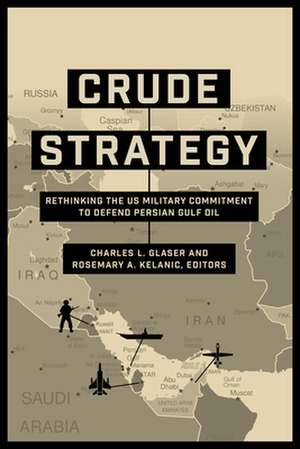Crude Strategy: Rethinking the Us Military Commitment to Defend Persian Gulf Oil
en Limba Engleză Paperback – 8 iul 2016
Should the United States ask its military to guarantee the flow of oil from the Persian Gulf? If the US security commitment is in fact strategically sound, what posture should the military adopt to protect Persian Gulf oil?
Charles L. Glaser and Rosemary A. Kelanic present a collection of new essays from a multidisciplinary team of political scientists, historians, and economists that provide answers to these questions. Contributors delve into a range of vital economic and security issues: the economic costs of a petroleum supply disruption, whether or not an American withdrawal increases the chances of oil-related turmoil, the internal stability of Saudi Arabia, budgetary costs of the forward deployment of US forces, and the possibility of blunting the effects of disruptions with investment in alternative energy resources. The result is a series of bold arguments toward a much-needed revision of US policy toward the Persian Gulf during an era of profound change in oil markets and the balance of power in the Middle East.
| Toate formatele și edițiile | Preț | Express |
|---|---|---|
| Paperback (1) | 291.90 lei 6-8 săpt. | |
| Georgetown University Press – 8 iul 2016 | 291.90 lei 6-8 săpt. | |
| Carte (1) | 654.87 lei 6-8 săpt. | |
| Georgetown University Press – 18 iul 2016 | 654.87 lei 6-8 săpt. |
Preț: 291.90 lei
Nou
55.85€ • 58.32$ • 46.23£
Carte tipărită la comandă
Livrare economică 04-18 aprilie
Specificații
ISBN-10: 1626163359
Pagini: 312
Dimensiuni: 152 x 229 x 18 mm
Greutate: 0.45 kg
Editura: Georgetown University Press
